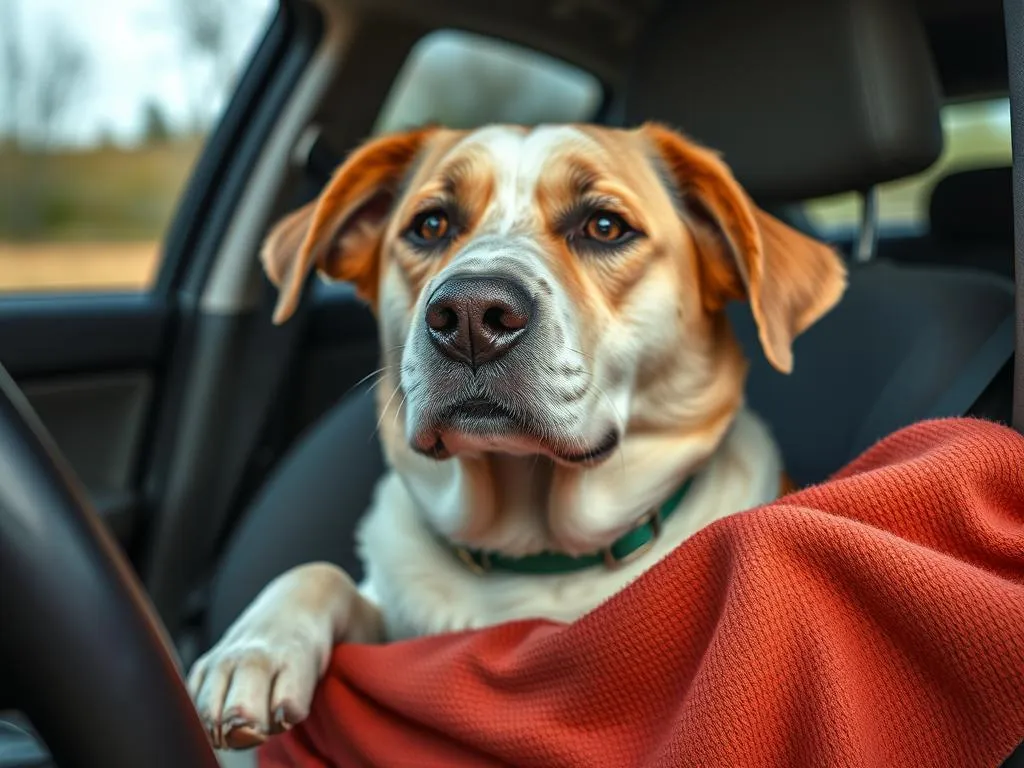
Introduction
Dog car sickness is a distressing condition that affects many furry companions during travel. Just like humans, dogs can experience discomfort when they are in a moving vehicle, leading to symptoms that can cause anxiety for both pet and owner. Understanding how to manage this condition is crucial not only for the pet’s health but also for the convenience of the owner.
In this article, we will explore the various natural remedies for dog car sickness, helping you to alleviate your dog’s discomfort while traveling. We will cover dietary adjustments, behavioral training techniques, herbal remedies, essential oils, and preventive measures. Our goal is to equip dog owners with the knowledge they need to make car travel a more pleasant experience for everyone involved.
Understanding Dog Car Sickness
What is Dog Car Sickness?
Dog car sickness is a form of motion sickness that occurs when a dog is traveling in a vehicle. This condition is characterized by a dog’s inability to adapt to the motion of the car, resulting in symptoms similar to those experienced by humans. While humans often understand the cause of their nausea, dogs may not have the same cognitive ability, which can lead to anxiety and distress.
Symptoms of Dog Car Sickness
Recognizing the symptoms of dog car sickness is essential for intervention. Common signs to look for include:
- Excessive drooling: This is often one of the first signs that your dog is feeling unwell.
- Vomiting: Frequent vomiting can occur during travel, which can be distressing for both the dog and the owner.
- Restlessness or anxiety: Dogs may pace, whine, or show signs of agitation.
- Whining or barking: Vocalizations can signal discomfort and anxiety during the ride.
Causes of Dog Car Sickness
Several factors can contribute to a dog’s car sickness:
-
Physical Factors: Just like humans, dogs have an inner ear that helps with balance. If this system is disrupted by the motion of the vehicle, nausea can ensue. Puppies and young dogs are more prone to car sickness because their inner ear is still developing.
-
Psychological Factors: Some dogs may experience anxiety associated with car travel. If your dog has had a negative experience in the car, they may become anxious, exacerbating symptoms of car sickness.
-
Environmental Triggers: Heat, confined spaces, and lack of fresh air can all contribute to a dog’s discomfort during travel.
Natural Remedies for Dog Car Sickness
Dietary Adjustments
One of the first steps toward alleviating car sickness in dogs is to make certain dietary adjustments before travel.
-
Importance of Feeding Before Travel: It’s crucial to plan your dog’s meals carefully. Feeding your dog too close to travel can increase the likelihood of nausea. Ideally, feed your dog a light meal at least three to four hours before the trip.
-
Types of Foods to Avoid: Avoid rich, fatty, or spicy foods before travel, as these can upset your dog’s stomach and worsen nausea.
-
Natural Anti-Nausea Foods: Incorporating certain foods into your dog’s diet can also help combat car sickness:
- Ginger: Known for its anti-nausea properties, ginger can be given in small amounts. You can try ginger snap cookies made for dogs or a small piece of fresh ginger root.
- Peppermint: This herb is known to soothe upset stomachs. A small amount of peppermint tea can be offered to your dog before travel.
- Plain Rice and Boiled Chicken: A bland diet of plain rice and boiled chicken can help settle a dog’s stomach if they are prone to nausea.
Behavioral Training Techniques
Training your dog to feel comfortable in the car is another effective way to reduce car sickness.
-
Desensitization to Car Travel: Gradual exposure can be a helpful method. Begin by letting your dog sit in the car while it’s parked. Gradually increase the time spent in the car, and eventually take short trips around the block.
-
Positive Reinforcement Methods: Rewarding your dog with treats and praise for calm behavior in the car can reinforce positive associations with travel.
-
Creating a Comfortable Travel Environment: Make the car a pleasant place for your dog. Use a dog crate or seat belt to keep them secure, and provide familiar blankets or toys to help ease anxiety.
Herbal Remedies
Herbs can be a wonderful natural solution for dog car sickness. Here are some safe options:
-
Ginger Root: As mentioned earlier, ginger is highly effective for nausea. You can offer it in various forms, such as fresh ginger root, tinctures, or capsules. Always consult your veterinarian for appropriate dosages.
-
Chamomile: Chamomile can help relax your dog and soothe the stomach. You can prepare chamomile tea and let it cool before offering it to your dog in small amounts.
-
Peppermint: Peppermint can also be used in the form of tea or capsules to help relieve nausea.
Essential Oils and Aromatherapy
Aromatherapy can be an effective way to soothe a dog experiencing car sickness.
- Safe Essential Oils for Dogs: Some essential oils are safe for dogs and can help alleviate anxiety and nausea. Consider using:
- Lavender: Known for its calming properties, lavender can help reduce anxiety during travel.
- Ginger: In addition to being ingested, ginger essential oil can be diffused to help settle the stomach.
-
Chamomile: This oil can also promote relaxation.
-
Methods of Application: Use essential oils in a diffuser to create a calming environment in the car. Alternatively, you can apply diluted oils topically on your dog’s collar or bandana. Always ensure that oils are diluted properly and that your dog does not have any sensitivities.
Preventive Measures
Preparing Your Dog for Travel
Taking steps to prepare your dog for travel can significantly reduce the likelihood of car sickness.
-
Pre-trip Routines: Engage your dog in some exercise before the trip. A short walk can help burn off excess energy and reduce anxiety. Also, consider reducing their food intake prior to travel to minimize the chance of nausea.
-
Creating a Calm Environment in the Vehicle: Keep the car at a comfortable temperature, and ensure that your dog has a designated space that feels safe. Limiting distractions within the car can also help keep your dog calm.
Regular Health Check-ups
Routine veterinary visits are crucial for maintaining your dog’s overall health. Regular check-ups can help identify any underlying health issues that may contribute to car sickness. Your veterinarian can also provide guidance on managing your dog’s specific needs.
When to Seek Professional Help
Signs That Require Veterinary Attention
While many cases of car sickness can be managed at home, there are instances where professional help is necessary. Look for these signs:
-
Severe Vomiting or Lethargy: If your dog is experiencing persistent vomiting or seems unusually lethargic, it’s important to consult a veterinarian.
-
Signs of Dehydration: Excessive vomiting can lead to dehydration, which is a serious condition requiring immediate attention.
-
Behavioral Changes After Travel: If your dog shows signs of distress or significant behavioral changes after travel, this may indicate a more serious issue.
Potential Medical Interventions
In severe cases, your veterinarian may prescribe medications to help manage car sickness. It’s essential to discuss the safety of any anti-nausea medications for dogs, as not all human medications are safe for canine use. Always follow your veterinarian’s recommendations for dosage and administration.
Conclusion
In conclusion, addressing dog car sickness is vital for your pet’s well-being and your travel experience. By exploring various natural remedies for dog car sickness, such as dietary adjustments, behavioral training techniques, herbal remedies, and essential oils, dog owners can help their furry friends enjoy car rides more comfortably.
Remember that every dog is unique, and what works for one may not work for another. It may take some trial and error to find the right combination of solutions that help your dog feel at ease during travel. Prioritizing your dog’s comfort during car rides can lead to a happier, healthier pet and a more enjoyable journey for you both.









